#michael pollan
Text

Large mammals such as elephants, whales, and tigers tend to get a disproportionate amount of attention when it comes to conservation. Birds and beneficial insects are often overlooked.
Northern Ontario residents are building bee hotels to attract them and to encourage them to produce more bees.
Bee my guest: Northerners build hotels for pollinators as spring unfolds
Lawns are one of the worst things for pollinators and birds. They encourage wasteful water practices and unnecessary chemical use.
Michael Pollan put it best...
"A lawn is nature under totalitarian rule."
It's time to help our airborne friends and overthrow the tyranny of lawns.
youtube
Natural looking green space may require a bit more effort at the start of the growing season but is a lot less work from week to week. It's worth it just to get rid of the noise pollution and fumes from lawn mowers.
Get your local municipal governments interested in supporting nature-friendly and climate-friendly landscaping practices.
#birds#bees#nature#bee hotels#north ontario#herbicides#pesticides#lawns#conservation#water use#nature under totalitarian rule#michael pollan#kill your lawn#monte wolverton
102 notes
·
View notes
Photo
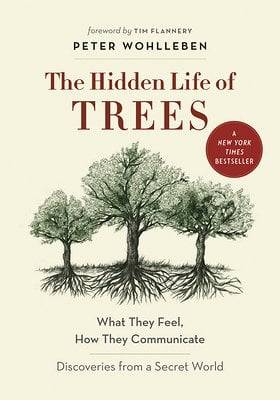
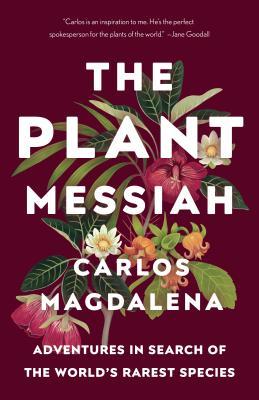

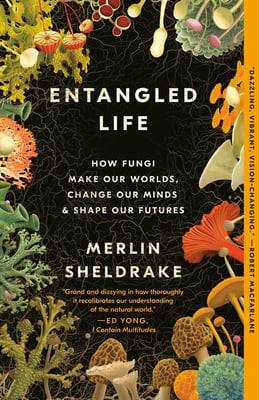


🌿 books about plants (& fungi) 🌿
#plants#books#braiding sweetgrass#entangled life#plant messiah#gathering moss#michael pollan#this is your mind on plants#merlin sheldrake#carlos magdalena#pop sci#robin wall kimmerer#conservation#nature books
230 notes
·
View notes
Text
"We humans apparently have a deep desire to complicate things — to embroider the most basic, biological response with the rich colors and textures of culture."
— This is Your Mind on Plants, Michael Pollan
#tfg reads#books#nonfiction#2024 reads#I just really liked this turn of phrase lol#quotes#this is your mind on plants#michael pollan#q
6 notes
·
View notes
Text
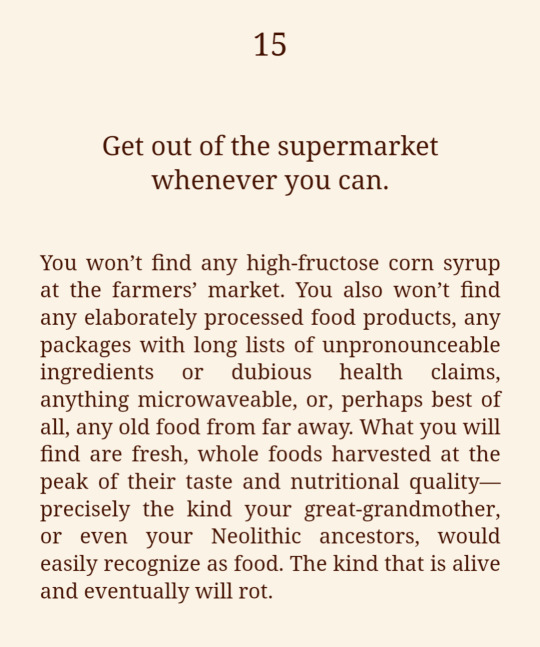
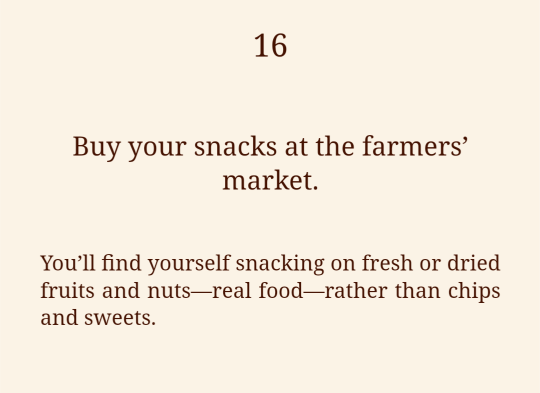
Michael Pollan's Food rules are so outdated 😂
Idk about ya'll but my local farmers market has tons of baked goods and snacks. There's a person selling freezedried candies usually. And there's people making outlandish health claims.
I love my farmers market but I go.to buy vegan treats and hummus like half the time
8 notes
·
View notes
Quote
Not only do plants nourish us bodily—they nourish us psychologically.
Michael Pollan

51 notes
·
View notes
Text
Food is not just fuel. Food is about
family, food is about community,
food is about identity. And we
nourish all those things when we
eat well.
(Michael Pollan)
24 notes
·
View notes
Photo

Source: The Heirloom Gardener John Forti Facebook page
Words: Michael Pollan
Art: The Gardener by Lizzie Riches
#garden#gardening#red green#go green#horticulture#gardener#quotes#lizzie riches#michael pollan#foxgloves#lemon tree#gardening tools#pots#planters#painting#art#contemporary art#symbolism art#surreal art#magical#garden gloves#cottagecore#plants
14 notes
·
View notes
Text
Eat food. Not too much. Mostly plants.
from In Defense of Food by Michael Pollan
#eat#eating#eat food#food#don't eat too much#don't overeat#eat plants#eat mostly plants#in defense of food#michael pollan#diet#nutrition#health
7 notes
·
View notes
Text
A Collection of Coincidences
For the past nine years, I worked on a book called Anagnorisis. It’s about a writer who becomes obsessed with coincidence, and writes a novel by letting coincidences determine the plot. In the process, he comes to believe God is speaking to him through his novel.
Now, to write it — I did the exact same thing.
I scoured the world for signs and symbols. I called it “collecting coincidences.”
Rigorously, I wrote this way right until the end, treating the world like a vast trail of breadcrumbs…
The meaning of signs and symbols only became clear when I would string them together and interpret them as a whole.
And that’s what I want to do here in my new blog.
Welcome to A Collection of Coincidences.
#spirituality#coincidence#mysticism#religion#spiritual disciplines#novel writing#writing#psychology#psychonauts#psychic#blog#blogger#autofiction#short story#weird dreams#lucid dreaming#wellness#joe rogan#michael pollan#motivation#motivating quotes#motivateyourself#mindfulness#mindset#personal development#personal diary#personal discovery#self discovery#self discipline
2 notes
·
View notes
Photo
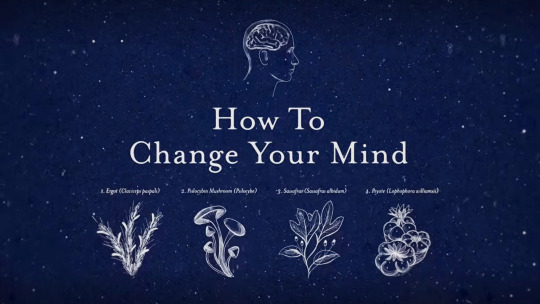

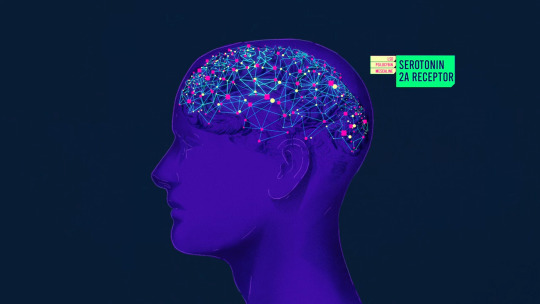

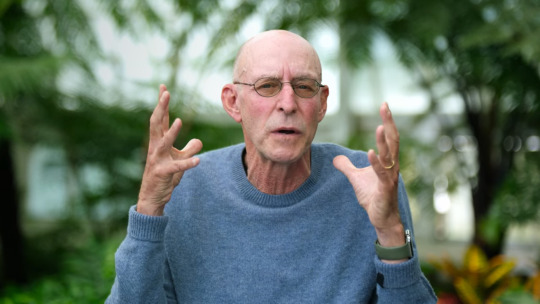

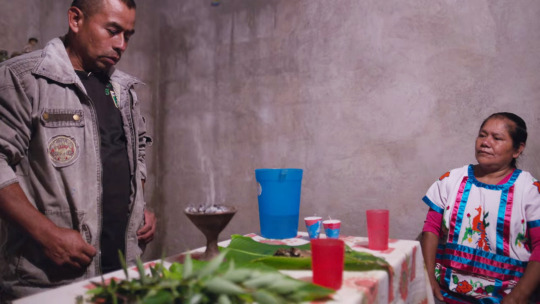
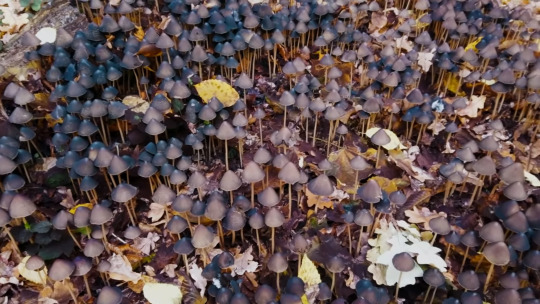

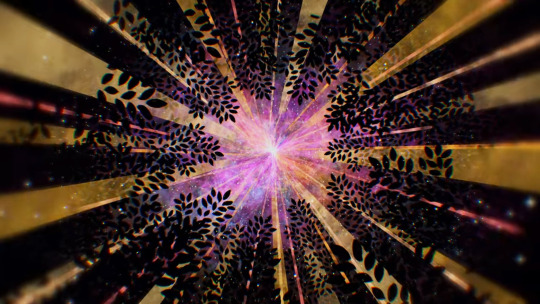
How to Change Your Mind (2022)
#How to Change Your Mind#Michael Pollan#Lucy Walker#Alison Ellwood#Albert Hofmann#Ram Dass#Timothy Leary#documentary#watched today
26 notes
·
View notes
Text
“One of the things that’s really driven me in my work with children and abuse is you see how the general public have so much empathy and gushing sentimentality for abused children and these poor little three, four, five, six-year-olds. By their twenties and thirties, they’re alcoholic and they’re addicted to heroin. And suddenly the public have turned off their empathy switch, and we’ve forgotten the developmental roots of that. And so, as I moved in my own career away from child and adolescent psychiatry into adults’ addictions, what became patently clear was that these patients in their thirties, forties, fifties with alcohol and opioid addictions were the same cohort of little four, five, six-year-olds that I’d cared for in the past.”
Dr. Ben Sessa, in an interview from How to Change Your Mind by Michael Pollan
#dr Ben sessa#michael pollan#psychiatry#psychology#how to change your mind#addiction#substance use#substance use disorder#abuse#trauma#childhood trauma#alcoholism#heroin#opioid#child psychiatry#childhood development#devolopmental psychology
25 notes
·
View notes
Text
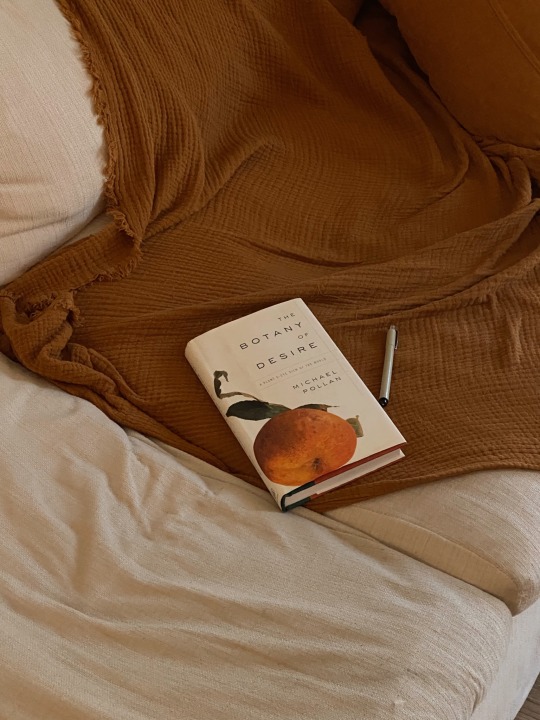
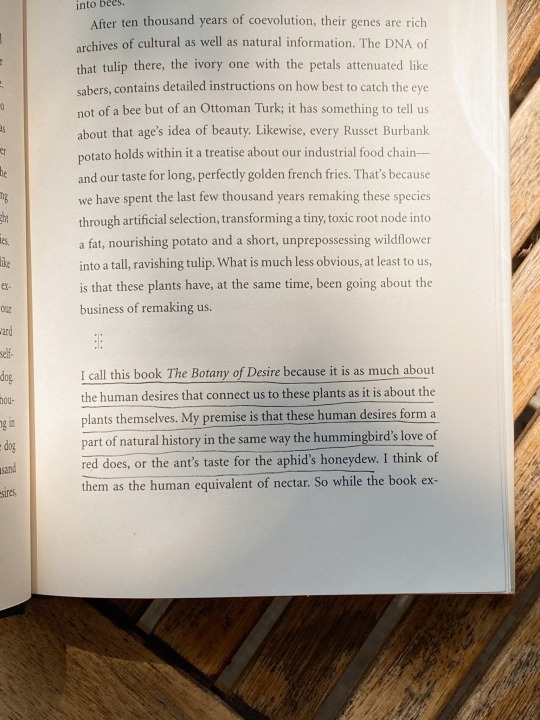
For anyone who loves plants and loves to learn about origin stories I think you’ll want to pick up ‘The Botany of Desire.’ Pollan tells the story of 4 plants and each is associated with 4 important human desires. This is one of my favorite reads from last year and the writing is fantastic. I learned so much! I can’t recommend this book enough!
IG: coffeeandbookss
#michael pollan#books#book recommendation#bookworm#books books books#love#favorite#beautiful#book quote#books and reading#reader#amazing#reccs#plants
10 notes
·
View notes
Text

Another one I’m currently reading.
“How to Change Your Mind: What the New Science of Psychedelics Teaches Us About Consciousness, Dying, Addiction, Depression, and Transcendence” by Michael Pollan
Back in the 50s and 60s psychedelic drugs like psilocybin and LSD were actually seen as helpful tools into understanding the human brain. Somewhere along the line it got a bad wrap with rumors of bad trips, people committing suicide while under the influence of these substances, and even the idea that someone would permanently lose their mind if they were to ever consume these compounds.
In recent years, starting back in the 90s, psychedelics made a come back in the mental health field. Credited with helping treat anxiety, depression, addiction and more in minuscule “micro-doses”, LSD and the active psychedelic compound in magic mushrooms, psilocybin, have slowly regained their reputation as being something almost spiritual.
It’s gone so far as for the federal government to allow the import of foreign psychedelic compounds and substances that naturally produce said substances like “ayahuasca” from Central and South America for religious purposes. These religious ties to psychedelic compounds has opened a lot of doors for those interested in the science and spirituality of psychedelics.
#tomework#book review#book blog#nonfiction#currently reading#history#pschedelic#how to change your mind#Michael pollan#untold history#drugs#LSD#psilocybin#ayahuasca#mdma#ecstasy#shrooms#magic mushrooms#depression#anxiety#addiction#alternative treatment
31 notes
·
View notes
Text
So the omnivores dilemma had a pretty profound effect on me when I first read it around age 20. It’s important to not discount the the thing that gets you engaged and thinking about an important issue. However, it’s equally as important to revisit those things over time and re-evaluate them based on current information and standards.
21 notes
·
View notes
Quote
Westerners tend to put medicine and religion in separate boxes, but for Native Americans (as for many traditional cultures), religion is foremost about healing.
Michael Pollan
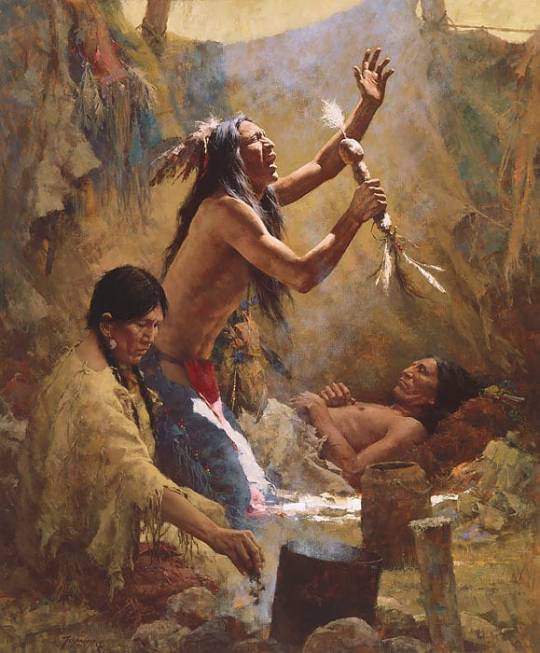
Medicine man of the Cheyenne
by Howard Terpning
134 notes
·
View notes
Text
Michael Pollan is quickly becoming one of my favorite popular NF writers. He's a straight white dude of a certain middle age, and you can mostly tease out his prejudices and preferences, but at the same time, he shows a remarkable ability to package radical reframing of our relationship with domesticated food species palatably for an average reader.
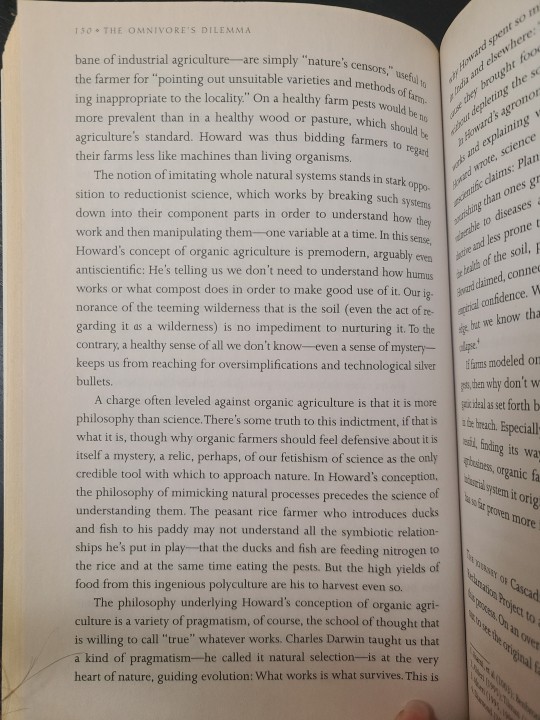
He's talking here about the history of the organic food movement since the moment the chemical industrial fertilizer mindset was invented (in the 1820s! By the guy who discovered which three elements were most critical for plant nutrition! We still mark fertilizers with this mindset today!). What Pollan is describing here is no less than a total abolishment of the primacy of the modern scientific view of agriculture. But he does not at any point argue that this is correct. He perfectly treads the line of presenting you with all the facts he's compiled in such a way as to lead you to believe in it because it's the only way to have hope as a human being in the future, is to imagine these things for ourselves.
Pp. 150, The Omnivore's Dilemma, Michael Pollan, 978-0-14-303858-0
4 notes
·
View notes